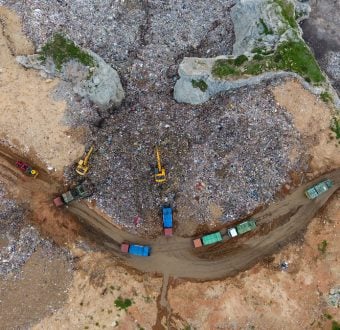Greenpeace Germany and three families have filed a lawsuit against the German Federal Government for violations of fundamental human rights resulting from the failure to take further measures to meet its national 2020 climate target.
The plaintiff families, who have filed the complaint at the Berlin Administrative Court, run organic farms on the island of Pellworm, in Altes Land near Hamburg, and in Brandenburg. They have been directly harmed by climate impacts, such as crop failures due to drought, heavy rains, other extreme weather events, and insect infestations.
“The plaintiff families are already experiencing how the climate crisis can become an existential threat to the people in our country,” said Anike Peters, climate expert at Greenpeace Germany. “Germany has committed to reduce greenhouse gases by 40 percent compared with 1990 levels by 2020. Without additional efforts, this target will clearly be missed and more people will be harmed. The German government must do everything it can to ensure that climate change does not increasingly endanger the livelihoods of families in this country.”
A recent study by the Fraunhofer Institute, on behalf of Greenpeace Germany, shows that Germany can still achieve its climate target for 2020 while maintaining a secure supply of electricity. To achieve it, the oldest third of the lignite-fired power plants must be shut down immediately, while the remaining lignite-fired power plants must be throttled down, and renewable energy alternatives such as solar and wind power must be systematically expanded. [1]
“If the German government fails to reduce CO2 emissions according to its own target, then it is allowing the impacts on the lives, professions, and property of the affected people, thus violating people’s fundamental rights,” says Dr. Roda Verheyen, the plaintiffs’ lawyer. “By failing to meet the 2020 climate target, the German government is also violating European environmental law.” As an environmental association, Greenpeace Germany is suing for compliance with German and European environmental law.
The complaint by Greenpeace Germany and the three families comes after the recent victory in Urgenda’s climate lawsuit in the Netherlands. Both are part of the wave of cases exerting pressure on governments and fossil fuel companies around the world to demand more ambitious climate action by decision-makers. [2] The surge in legal action includes climate cases and an investigation brought by: KlimaSeniorinnen, an association representing more than 1,000 senior women, concerning Switzerland’s inadequate climate policies and mitigation measures; Nature and Youth and Greenpeace Nordic concerning violations of the Norwegian Constitution’s environmental Article §112 for opening up a vast new area for oil and gas drilling in the Norwegian Arctic; families in the European Union, Kenya, and Fiji challenging the EU’s climate policies; and the Commission of Human Rights in the Philippines investigation into the responsibility of 47 coal, oil, gas, and cement companies for climate-related human rights harms.
Notes
[1] Fraunhofer Study, – How Germany can still achieve its climate target: https://act.gp/2z54rRw (in German)
[2] Greenpeace International, Think we can’t win on climate change? This victory by Dutch citizens will change your mind, 11 October 2018, https://www.greenpeace.org/international/story/18933/think-we-cant-win-on-climate-change-this-victory-by-dutch-citizens-will-change-your-mind/.


